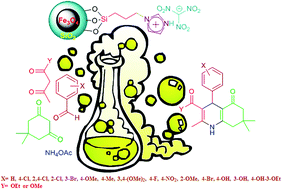Novel magnetic nanoparticles with ionic liquid tags as a reusable catalyst in the synthesis of polyhydroquinolines†
Abstract
In this study, we have introduced {Fe3O4@SiO2@(CH2)3Im}C(NO2)3 as a novel and heterogeneous reusable catalyst for the four component preparation of polyhydroquinoline derivatives under mild and eco-friendly reaction conditions. The structural confirmation of the novel heterogeneous reusable promoter was fully made using FT-IR, X-ray diffraction (XRD), field emission scanning electron microscopy (FESEM), energy-dispersive spectroscopy (EDS) elemental mapping analysis, high resolution transmission electron microscopy (HRTEM), thermogravimetry (TG), derivative thermal gravimetric (DTG), differential thermal (DTA) and vibrating sample magnetometer (VSM) analyses. The nanomagnetic heterogeneous catalyst was successfully applied for the synthesis of polyhydroquinoline derivatives via a four component condensation of a good range of aryl aldehydes, dimedone, ethyl acetoacetate or methyl acetoacetate as a β-ketoester, and ammonium acetate as a nitrogen source under solvent free conditions. Moreover, experimental evidence has demonstrated that {Fe3O4@SiO2@(CH2)3Im}C(NO2)3 could act as a recoverable nanomagnetic and reusable catalyst without any considerable drop in the yield and the reaction time for at least eight times.



 Please wait while we load your content...
Please wait while we load your content...